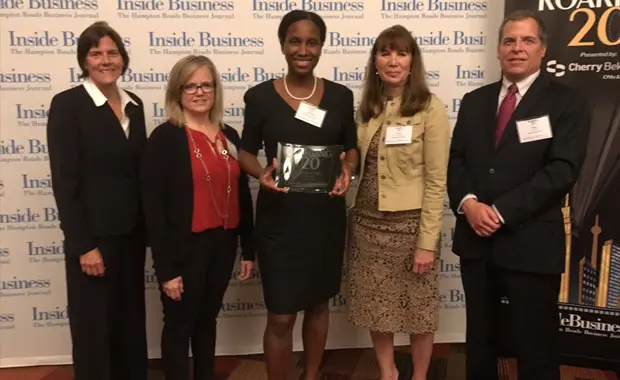
Urology of Virginia traces its roots to 1922 when Dr. Charles Devine Sr., a world-renowned urological surgeon, opened his practice in Norfolk.
He was joined by his sons Charles Devine Jr. and Patrick Devine. They established a urology residency program at Norfolk General Hospital and were instrumental in the establishment of Eastern Virginia Medical School where the current urology residency resides. In 1997, the practice joined with six other practices to create Urology of Virginia.
Over the years, the practice has grown to include more than 300 employees, including 34 board-certified physicians and other medical professionals such as physician assistants, nurses and technician.
The practice has six locations offering a variety of services. The location on Clearfield Avenue in Virginia Beach was designed to be a one-stop shop and houses the Paul F. Schellhammer Cancer Center and The Devine-Jordan Center for Reconstructive Surgery and Pelvic Health along with patient-focused services including on-site laboratory, physical therapy and pharmacy.
Urology of Virginia CEO Dr. Mike Fabrizio said the primary focus of the practice is to provide high-quality urological health care and deliver state-of-the-art therapy to patients in the area.
“Our goal is to grow, to provide better access to our patients regionally, and to continue to provide facilities where they can experience lower cost health care that’s still of the highest quality,” he said.
To further its reach and to meet the high demand for urological specialists, the practice intends to expand its territory into North Carolina and western Virginia.
“There are about 11,000 urologists actively practicing in the United States, of which only 8,800 are full-time. So when you think about 330 million people being served by 8,800 full-time urologists, that’s difficult,” Fabrizio said. “So what you have to do is make sure that you are maximizing your efficiency.”
To best meet the needs of patients, the practice puts a premium on maintaining high academic standards for the physicians who are brought on board.
“We’ve hired highly trained, fellowship-trained urologists in the fields of urological oncology, minimally-invasive urology, robotics, stone disease and men’s and women’s health,” Fabrizio said. “We have more fellowship-trained faculty than most academic departments in the United States. “That’s something that we pride ourselves on.”
The challenges of all businesses – rising expenses for salaries and the cost of supplies – are also faced by medical practices, though the latter face unique challenges as well. As the practice continues to grow, Fabrizio said, it faces increasing technology needs and expenses in order to report data to the government in compliance with The Medicare Access and Children’s Health Insurance Program Reauthorization Act, or MACRA, which became law in 2015.
Fabrizio said another significant challenge medical practices face is the fact that Virginia is a Certificate of Public Need state, which drives up costs.
“In the state of Virginia, most health care still resides in hospital-based systems which are free to charge more for a given procedure, X-ray, lab study or even office visit.
So, independent, large physician groups like ourselves are limited in providing low-cost health care because it’s much more expensive to provide health care in a hospital-based setting as opposed to an ambulatory setting.”